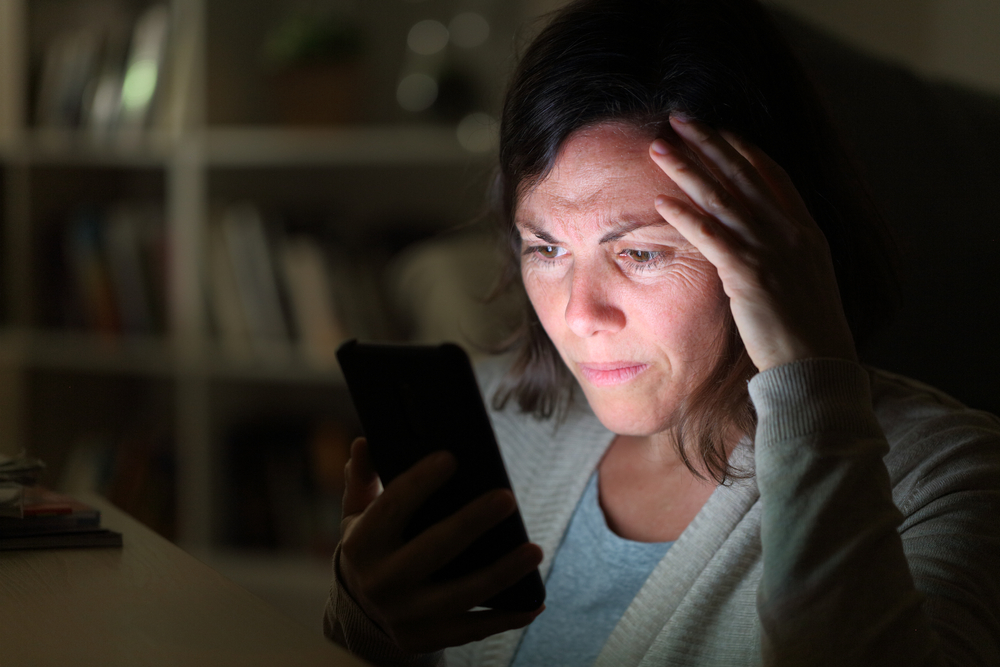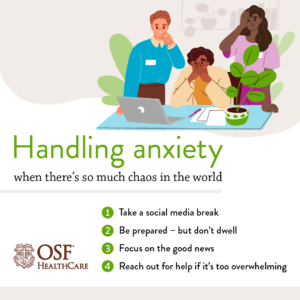
How to deal with news anxiety and stress
We live in a world where the news is available at our fingertips.
These days, we consume bad news in surround sound. Being immersed in the daily reports of violence, crime, war and mudslinging can have an effect on our mental health – and it’s not a good one.
Cheryl Crowe, vice president of Behavioral Health at OSF HealthCare, shared some tips about dealing with news-induced anxiety and stress.
What does news anxiety look like?
“It’s natural to experience anxiety when we see volatile or dangerous events happen,” Cheryl said.
You may not feel anxious while watching the news or have a fear of scrolling through your social media feed, but you may realize later you feel anxious because of the news you’ve taken in.
News anxiety tends to become obvious when we go to participate in the daily events of life – like going to the grocery store, enjoying a concert or heading off to work. We become inundated with thoughts about what could go wrong.
“Being in those negative head spaces is not healthy. It’s unusual that events like these happen, and we can’t be stuck on the what-ifs,” Cheryl said. “If we get anxious after consuming news – thinking about all of the things that could go wrong, then we’ve probably consumed too much news.”
How to deal with negative news
It’s important to be well-informed, but it shouldn’t be at the expense of our well-being. Here are Cheryl’s suggestions for finding balance while staying informed.
1. Be prepared, but don’t dwell
“Often, these are isolated events of violence,” Cheryl said. “But they do happen, so we want to feel prepared with a plan in the rare case that they occur.”
Cheryl suggests having a family meeting to prepare an emergency response plan.
“It could be as simple as saying, ‘If we get separated, this is our plan.’”
After you’ve established a family plan for responding in an emergency, don’t dwell on the bad things that could happen. Continue with your regular activities with a healthy caution.
2. Make rational decisions and be comfortable with your decisions
If your gut is saying it’s unsafe to go to a large gathering, don’t go.
“Only you know what your comfort level is, and you need to make decisions that are best for you and your loved ones,” Cheryl said.
Once you make a decision, be comfortable that you’ve gone with what you think is best, and then move on.
3. Unplug from social media when it gets to be too much
Social media can be good for many things, but it’s not good when it hurts our mental health.
“Social media can overwhelm us and give us an unhealthy fear of going outside and to certain events. That serves no value to us,” Cheryl said.
If the news is too much and you notice that you are having a hard time putting away the anxious thoughts, it’s good to unplug from social media. You can totally unplug, or resolve to only check social media once a day for a short period of time.
4. Find joy in positive experiences
While the events we see on the news can be distressing, we don’t want to be paralyzed by fear.
“We want to find joy in life, and we want children to have positive experiences,” Cheryl said. “There’s a lot of joy and wonderful things in our environments, and we want to make sure we experience those.”
How to know when it’s too much
“If you’re having difficulty shaking off the news, it may be time to talk to a counselor,” Cheryl said. “A counselor can help you sort through those feelings, feel secure and become empowered to make rational decisions without overthinking what could go wrong.”
Can’t shake the negative thoughts and feelings?
If you’re having a hard time putting those thoughts and feelings of fear aside even after you’ve taken a break from the news, you should prioritize your mental health for the good of you and your loved ones.
It’s good to be aware of what’s going on in the world, but with a 24-hour news cycle, it’s easy to become consumed by the bad news. Taking the time to take stock of how much news is too much news is a good way to cut out the noise that causes unnecessary stress and anxiety from watching the news.
